人教版高中英语必修五Unit1知识点详解和练习(无答案)
高中英语人教版必修5知识点汇总

必修5Unit 1 Great scientists核心单词1. characteristicn.特色;特性;典型adj.特有的,表示特性的;典型的Kindness is one of his characteristics.和善是他的特性之一。
A characteristic of the camel is its ability to live for a long time without water.骆驼的一个特点是不喝水也能活很长时间。
\易混辨析character/characteristiccharacter n.性格,品质(本身具有的);角色,人物;字体,字符characteristic n. 特点,特征(用以区别于其他事物的)2. defeatvt.击败;打败;使(计划、希望)落空Our team defeated our opponent by 5:0.我们队以五比零的比分战胜了对手。
He was defeated in his plan.他的计划失败了。
-易混辨析defeat/conquer/overcome三个词都含有“战胜”、“击败”的意思。
defeat指“赢得胜利”,尤其指军事上的胜利,如:defeat the enemy(打败敌人)。
conquer指“征服;战胜”,尤其指获得对人、物或感情的控制,如:conquer nature(征服自然)。
overcome指“战胜;压倒;克服”,尤其指“感情”,如:overcome difficulties(克服困难)。
defeat/beat/windefeat, beat都表示在战斗或竞赛中“战胜,打败(对手)”,后接竞争对手。
如:beat the competitor/the country/the team ...打败对手/国家/团队……》win也表示“战胜,赢得”,但它的宾语通常是比赛、战争、奖品或表示尊重、崇拜之类意义的词。
人教版高中英语必修五unit1课文重点练习详解
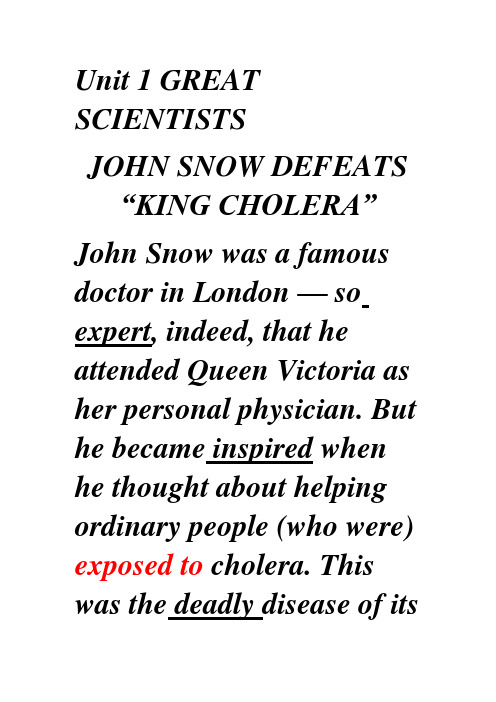
Unit 1 GREAT SCIENTISTSJOHN SNOW DEFEATS“KING CHOLERA”John Snow was a famous doctor in London — so expert, indeed, that he attended Queen Victoria as her personal physician. But he became inspired when he thought about helping ordinary people (who were) exposed to cholera. This was the deadly disease of itsday. Neither its cause nor its cure was understood. So many thousands of terrified people died every time there was an outbreak. John Snow wanted to face the challenge and solve this problem. He knew that cholera would never be controlled until its cause was found.(expose:1暴露be exposed to all kinds of weather.经受风吹雨打。
Expose sb to danger 使某人面临危险。
A student who has been exposed to English for some 6 years.接触英语达六年左右的学生。
2.揭露。
Expose a politician’s lies. He has been exposed as a liar.他说谎的行为被揭穿。
)He became interested in two theories(that possibly explained how cholera killed people). The firstsuggested that cholera multiplied in the air, a cloud of dangerous gas floated around until it found its victims. From the stomach the disease quickly attacked the body and soon the affected person died. John Snow suspected that the second theory was correct but he needed evidence. So when another outbreak hit London (There was anotheroutbreak)in 1854, he was ready to begin his enquiry. As the disease spread quickly through poor neighbourhoods, he began to gather information. In two particular streets, the cholera outbreak was so severe that more than 500 people died in ten days. He was determined to find out why.First he marked on a map the exact places(where allthe dead people have lived). This gave him a valuable clue about the cause of the disease. Many of the deaths were near the water pump in Broad Street (especially numbers 163738 and 40). He also noticed that some houses (such as 20 and 21 Broad Street and 8 and 9 Cambridge Street) had had no deaths. He had not foreseen this, so he made further investigations. Hediscovered that these people worked in the pub at 7 Cambridge Street. They had been given free beer and so had not drunk the water from the pump. It seemed that the water was to blame,Next, John Snow looked into the source of the water for these two streets. He found that it came from the river(polluted by the dirty water from London). Heimmediately told the astonished people in Broad Street to remove the handle from the pump so that it could not be used. Soon afterwards the disease slowed down. He had shown that cholera was spread by germs and not in a cloud of gas.In another part of London, he found supporting evidence from two other deaths(thatwere linked to the Broad Street outbreak.)A woman,(who had moved away from Broad Street,)liked the water from the pump so much that she had it delivered to her house every day. Both she and her daughter died of cholera after drinking the water. With this extra evidence John Snow was able to announce with certaintythat polluted water carried the virus.To prevent this from happening again, John Snow suggested that the source of all the water supplies be examined. The water companies were instructed not to expose people to polluted water any more. Finally “King Cholera” was defeated.COPERNICUS’REVOLUTIONAYTHEORY Nicolaus Copernicus was frightened and his mind was confused. Although he had tried to ignore them, all his mathematical calculations led to the same conclusion: that the earth was not the centre of the solar system. Only (if you put the sun there) did the movements of the otherplanets in the sky make sense. Yet he could not tell anyone about his theory as the powerful Christian Church would have punished him for even suggesting such an idea. They believed God had made the world and for that reason the earth was special and must be the centre of the solar system. (Only: we can succeed only in this way. →Only( in this way) can we succeed.)The problem arose because astronomers had noticed that some planets in the sky seemed to stop, move backward and then go forward in a loop. Others appeared brighter at times and less bright at others. This was very strange if the earth was the centre of the solar systemand all planets went around it.Copernicus had thought long and hard about these problems and tried to find an answer. He had collected observations of the stars and used all his mathematical knowledge to explain them. But only new theory could do that. So between 1510 and 1514 he worked on it, graduallyimproving his theory until he felt it was complete.In 1514 he showed it privately to his friends. The changes (he made to the old theory) were revolutionary. He placed a fixed sun at the centre of the solar system with the planets going round it and only the moon still going around the earth. He also suggested that the earth was spinning as it went around the sun andthis explained changes in the movement of the planets and in the brightness of the stars. His friends were enthusiastic and encouraged him to publish his ideas, but Copernicus was cautious. He did not want to be attacked by the Christian Church, so he only published it as he lay dying in 1543.(with﹢宾语﹢1)doing2)/done/3)介词短语/4)形容词5)副词6)to do:He slept with the window open (with the light on).The teacher came with a book in his hand (under his arm).With a lot of homeworkto do, I had to stay at home last weekend.With the crowds cheering, the royal party drove into the palace.With signal given, the train left the station.) Certainly he was right to be careful. The Christian Church rejected his theory, saying it was against God’s idea and people (who supported it) would be attacked. Y et Copernicus’ theory is now the basis (on which all our ideas of theuniverse are built.) His theory replaced the Christian idea of gravity, (which said things fell to earth because God created the earth as the centre of the universe.) Copernicus showed this was obviously wrong. Now people can see that there is a direct link between his theory and the work of Isaac Newton, Albert Einstein and Stephen Hawking.(辨析reject,refuse,turn down, decline.Reject:断然拒绝。
高中人教版英语 Book 5 Unit1知识点归纳
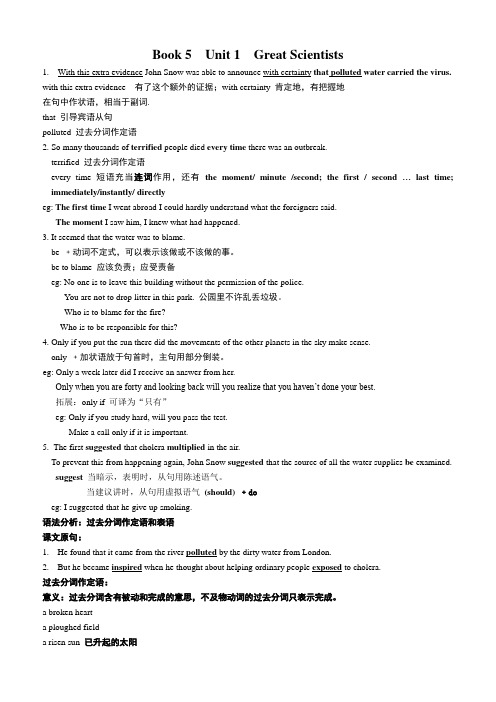
Book 5 Unit 1 Great Scientists1. With this extra evidence John Snow was able to announce with certainty that polluted water carried the virus. with this extra evidence 有了这个额外的证据;with certainty肯定地,有把握地在句中作状语,相当于副词.that 引导宾语从句polluted 过去分词作定语2. So many thousands of terrified people died every time there was an outbreak.terrified 过去分词作定语every time 短语充当连词作用,还有the moment/ minute /second; the first / second …last time; immediately/instantly/ directlyeg: The first time I went abroad I could hardly understand what the foreigners said.The moment I saw him, I knew what had happened.3. It seemed that the water was to blame.be﹢动词不定式,可以表示该做或不该做的事。
be to blame 应该负责;应受责备eg: No one is to leave this building without the permission of the police.Y ou are not to drop litter in this park. 公园里不许乱丢垃圾。
Who is to blame for the fire?Who is to be responsible for this?4. Only if you put the sun there did the movements of the other planets in the sky make sense.only ﹢加状语放于句首时,主句用部分倒装。
(人教)高中英语必修五Unit1知识点详解.pdf

必修5 Unit1 Great scientistsPart 1. Warming up1.explain及物动词(vt.)解释;说明;阐明[(+to)][+wh-][+(that)]He explained that he had been cheated. 他解释说他是上当受骗了。
Can you explain how the machine operates?你能解释一下这机器是如何运转的吗?Please explain this rule to me.请给我讲解一下这条规则。
不及物动词(vi.)解释;说明;辩解I've got to explain about it. 我得解释一下此事。
2.characteristicn. 特征;特性Kindness is one of his characteristics.adj. 独特的I heard my friend’s characteristic laugh.be characteristic of sb./sth. 是.....的特性Such bluntness is characteristic of hin. 如此迟钝是他的特性。
3. Who put forward a theory about black holes?put forward 提出(建议等);提名;提前,把时钟往前拨He put forward a new plan. 他提出一个新计划。
May I put your name forward as a possible chairman of the committee?我能否提名你当委员会主席?[归纳拓展]put down 记下;镇压put out 关掉;熄灭put aside 放在一边;储存;保留put off 推迟;延期put up 建造;举起;张贴put on 穿上put away 收好Part 2. Pre-reading, reading and comprehending1. Do you know how to prove a new idea in scientific researchhow to prove a new idea 为“疑问词+不定式”结构,该结构可在句中作主语、宾语、表语等。
人教版高二英语 必修五unit1 知识点
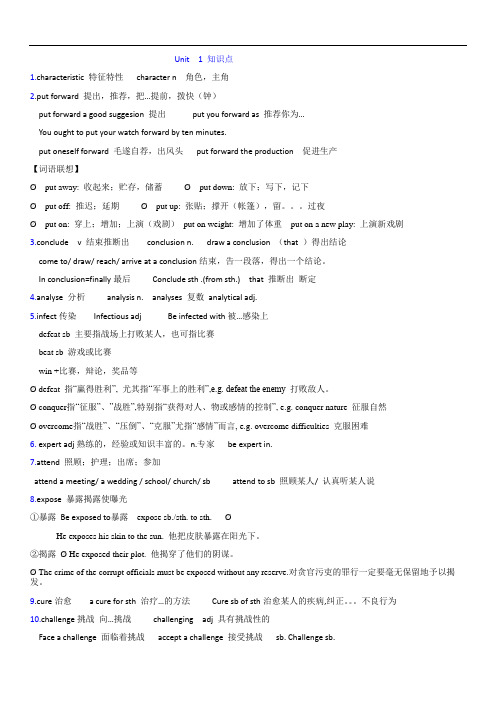
Unit 1 知识点1.characteristic 特征特性character n 角色,主角2.put forward 提出,推荐,把…提前,拨快(钟)put forward a good suggesion 提出put you forward as 推荐你为…You ought to put your watch forward by ten minutes.put oneself forward 毛遂自荐,出风头put forward the production 促进生产【词语联想】Ø put away: 收起来;贮存,储蓄Ø put down: 放下;写下,记下Ø put off: 推迟;延期Ø put up: 张贴;撑开(帐篷),留。
过夜Ø put on: 穿上;增加;上演(戏剧)put on weight: 增加了体重put on a new play: 上演新戏剧3.conclude v 结束推断出conclusion n. draw a conclusion (that )得出结论come to/ draw/ reach/ arrive at a conclusion结束,告一段落,得出一个结论。
In conclusion=finally最后Conclude sth .(from sth.) that 推断出断定4.analyse 分析analysis n. analyses 复数analytical adj.5.infect传染Infectious adj Be infected with被…感染上defeat sb 主要指战场上打败某人,也可指比赛beat sb 游戏或比赛win +比赛,辩论,奖品等Ø defeat 指“赢得胜利”, 尤其指“军事上的胜利”,e.g. defeat the enemy 打败敌人。
超全超详细 人教版高中英语必修五各单元知识点总结
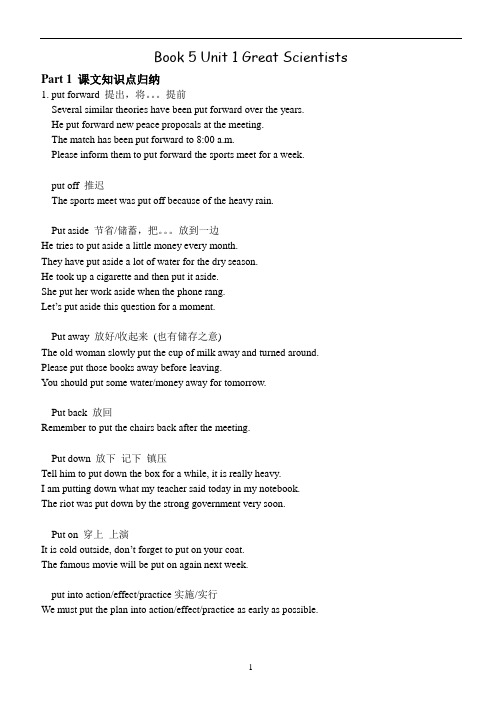
Book 5 Unit 1 Great ScientistsPart 1 课文知识点归纳1. put forward 提出,将。
提前Several similar theories have been put forward over the years.He put forward new peace proposals at the meeting.The match has been put forward to 8:00 a.m.Please inform them to put forward the sports meet for a week.put off 推迟The sports meet was put off because of the heavy rain.Put aside 节省/储蓄,把。
放到一边He tries to put aside a little money every month.They have put aside a lot of water for the dry season.He took up a cigarette and then put it aside.She put her work aside when the phone rang.Let’s put aside this question for a moment.Put away 放好/收起来(也有储存之意)The old woman slowly put the cup of milk away and turned around. Please put those books away before leaving.You should put some water/money away for tomorrow.Put back 放回Remember to put the chairs back after the meeting.Put down 放下记下镇压Tell him to put down the box for a while, it is really heavy.I am putting down what my teacher said today in my notebook.The riot was put down by the strong government very soon.Put on 穿上上演It is cold outside, don’t forget to put on your coat.The famous movie will be put on again next week.put into action/effect/practice实施/实行We must put the plan into action/effect/practice as early as possible.put up with 忍受she never stops complaining, I can’t put up with her another day/any more.Bear bear with 基本一样bear with多了理解、体谅的味儿。
人教版高中英语必修5_unit_1_单词讲解

attend是正式用语(yòngyǔ),及物动词,指参加 会议,婚礼,葬礼,典礼;去上课,上学, 听报告等。句子的主语只是去听,去看,自 己不一定起积极作用。
attend a meeting/a wedding/a funeral/ a ceremony/a lecture attend school去上学 attend class去上课 attend church去教堂;做礼拜
• 拓展:vt.+sb. +of sth.结构的短语还有: remind sb. of sth.提醒某人某事 suspect sb. of sth.怀疑某人某事 warn sb of sth警告某人 某事
精品PPT
rob sb. of sth.抢了某人某物 convince sb of sth说服某人 某事
challengeable 挑战性的 n. (c)challenger 挑战者
精品PPT
15.absorb vt. 吸收,吸进(液体、气体等);理 解,获取(信息);吸引住某人的注意力或兴趣 absorb water(=take in) 吸收水 absorb what sb. said 理解某人所说的话 absorb one's attention 吸引某人的注意力 be absorbed in... 全神贯注于……
inform sb. of sth.通知某人某事 deprive sb. of sth.夺去 某人某物
accuse sb. of sth.控告某人某事=charge sb with sth 13.outbreak n[c](战争(zhànzhēng),疾病等)爆发;
突然发生 break out (战争(zhànzhēng),疾病等) 爆发 短语 Tornado Outbreak龙卷风爆发; disease outbreak疾病爆发 outlook n. 前景,展望; 见解;景色;眺望处 v. 瞪着 看,瞧;比…漂亮;用目光压倒
高中英语必修五unit1知识点
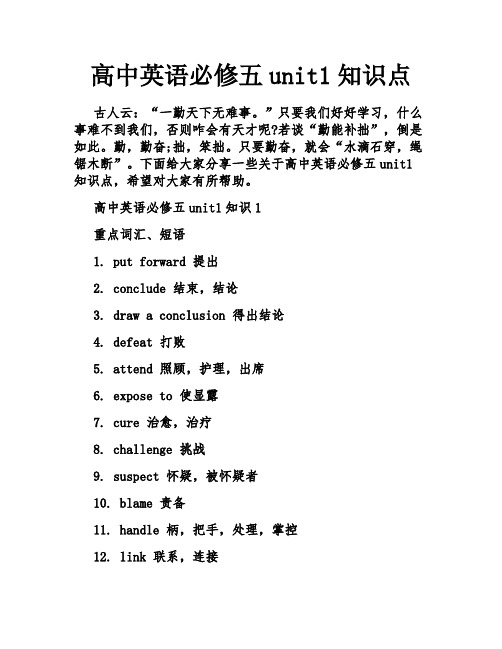
高中英语必修五unit1知识点古人云:“一勤天下无难事。
”只要我们好好学习,什么事难不到我们,否则咋会有天才呢?若谈“勤能补拙”,倒是如此。
勤,勤奋;拙,笨拙。
只要勤奋,就会“水滴石穿,绳锯木断”。
下面给大家分享一些关于高中英语必修五unit1知识点,希望对大家有所帮助。
高中英语必修五unit1知识1重点词汇、短语1. put forward 提出2. conclude 结束,结论3. draw a conclusion 得出结论4. defeat 打败5. attend 照顾,护理,出席6. expose to 使显露7. cure 治愈,治疗8. challenge 挑战9. suspect 怀疑,被怀疑者10. blame 责备11. handle 柄,把手,处理,掌控12. link 联系,连接13. link to 将…和…连接14. announce 宣布15. contribute 捐献,贡献16. apart from 除了17. be strict with 对…严格18. make sense 讲的通,有意义19. spin 使旋转20. reject 拒绝,抛弃高中英语必修五unit1知识2重点句型1. What do you know about infectious diseases?你对传染性疾病了解多少?2. John Snow was a famous doctor in London – so expert, indeed, that he attended Queen Victoria as her personal physician.约翰?斯诺是伦敦一位著名的医生——他的确医术精湛,因而成为维多利亚女王的私人大夫。
3. But he became inspired when he thought about helping ordinary people exposed to cholera.但当他一想到要帮助患了霍乱的普通老百姓,他就感到很振奋。
高二英语人教课标必修5 unit1_知识点讲解.
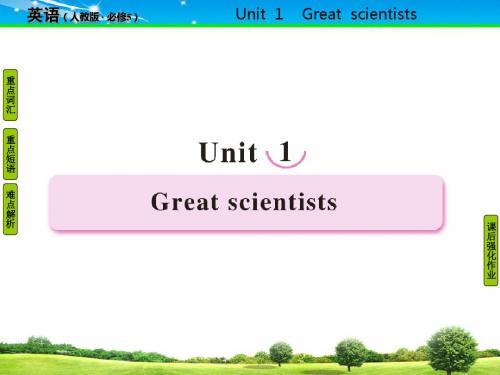
功能 语法
描述人物(Describing people: characteristics and qualities)
过去分词作定语和表语(The Past Participle as the Attribute and the Predicative)
英语(人教版 ·必修5)
答案:B
课 后 强 化 作 业
英语(人教版 ·必修5) 2.characteristic
重 点 词 汇 重 点 短 语 难 点 解 析
Unit 1
Great scientists
1)adj.~(of sb./sth.) 典型的;独特的;特有的
①Sympathy is the characteristic feeling of mankind. 同情心是人类特有的感情。
Unit 1
Great scientists
重 点 词 汇 重 点 短 语 难 点 解 析
课 后 强 化 作 业
英语(人教版 ·必修5)
Unit 1
Great scientists
重 点 词 汇 重 点 短 语 难 点 解 析
1.discover v. 发现;发觉 ①Columbus discovered American in 1492.
课 后 强 化 作 业
英语(人教版 ·必修5) 活学活用
重 点 词 汇 重 点 短 语 难 点 解 析
Unit 1
Great scientists
Please go and________when the train leaves.
A.find C.discover B.find out D.invent
重 点 词 汇 重 点 短 语 难 点 解 析
(完整版)人教版高中英语必修五Unit1知识点详解
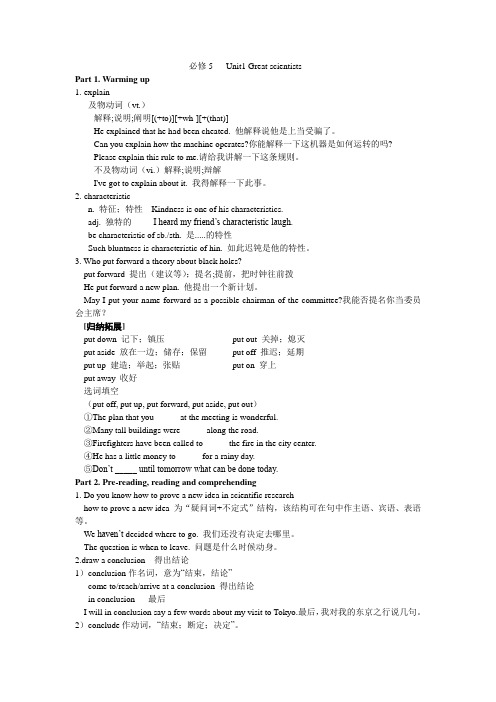
必修5 Unit1 Great scientistsPart 1. Warming up1.explain及物动词(vt.)解释;说明;阐明[(+to)][+wh-][+(that)]He explained that he had been cheated. 他解释说他是上当受骗了。
Can you explain how the machine operates?你能解释一下这机器是如何运转的吗?Please explain this rule to me.请给我讲解一下这条规则。
不及物动词(vi.)解释;说明;辩解I've got to explain about it. 我得解释一下此事。
2.characteristicn. 特征;特性Kindness is one of his characteristics.adj. 独特的I heard my friend’s characteristic laugh.be characteristic of sb./sth. 是.....的特性Such bluntness is characteristic of hin. 如此迟钝是他的特性。
3. Who put forward a theory about black holes?put forward 提出(建议等);提名;提前,把时钟往前拨He put forward a new plan. 他提出一个新计划。
May I put your name forward as a possible chairman of the committee?我能否提名你当委员会主席?[归纳拓展]put down 记下;镇压put out 关掉;熄灭put aside 放在一边;储存;保留put off 推迟;延期put up 建造;举起;张贴put on 穿上put away 收好选词填空(put off, put up, put forward, put aside, put out)①The plan that you _____ at the meeting is wonderful.②Many tall buildings were _____ along the road.③Firefighters have been called to _____ the fire in the city center.④He has a little money to _____ for a rainy day.⑤Don’t _____ until tomorrow what can be done today.Part 2. Pre-reading, reading and comprehending1. Do you know how to prove a new idea in scientific researchhow to prove a new idea 为“疑问词+不定式”结构,该结构可在句中作主语、宾语、表语等。
高一 人教必修5 Unit 1 Book 5 知识点清单

负责adj. / n.
建设v. / n. / adj.
贡献v. / n. / adj.
创造v. / n . / adj.
合作v. / n . / adj.
私下adj. / adv. / n.
明亮adj. / n. / v.
热情adj. / n.
小心谨慎adj. / n.
0402知识点清单
一、词性词形变化
科学(家)n. / n. / adj.
结束推断v. / n.
分析v. / n. / adj.
传染v. / n. / adj.
致命死亡v. / n. / adj. / adj.
怀疑嫌疑人v. / n. / n.
调查v. / n.
宣告v. / n.
确定确信adj. / adv. / n.
2.To prevent this________happening again, John Snow suggested that the source of all the water supplies_____________ (examine).
3.Only________you put the sun there_______the movements of the other planets in the sky make sense.
做进一步调查
该受到指责该怪某人某物
调查水源
减缓
通过细菌传播
跟…有联系3
肯定地
预防某事再次发生
指示某人干某事
战胜…4
吸收理解欺骗
结束
患严重疾病
对…做贡献
除了此外即使不考虑
排除困难前往某处
人教版高中英语必修五Unit1知识点详解

必修5 1 1.及物动词〔.〕解释;说明;说明[()][][+()]. 他解释说他是上当受骗了。
?你能解释一下这机器是如何运转的吗?.请给我讲解一下这条规那么。
不及物动词〔.〕解释;说明;辩白I' . 我得解释一下此事。
n. 特征;特性 .. 独特的I ’s .. 是.....的特性. 如此迟钝是他的特性。
3. a ?提出〔建议等〕;提名;提前,把时钟往前拨a . 他提出一个新方案。
I a ?我能否提名你当委员会主席?[归纳拓展]记下;镇压关掉;熄灭放在一边;储存;保存推迟;延期建造;举起;张贴穿上收好选词填空④ a a .⑤’t .2. ,1. aa 为“疑问词+不定式〞构造,该构造可在句中作主语、宾语、表语等。
’t . 我们还没有决定去哪里。
. 问题是什么时候动身。
2 a 得出结论1)作名词,意为“完毕,结论〞a 得出结论最后I a .最后,我对我的东京之行说几句。
2〕作动词,“完毕;断定;决定〞。
〔作插入语〕最后,作为总结(= ), I .3 a —, , . 约翰·斯诺是伦敦一位著名的医生——他确实医术精湛,以至于成了照料维多利亚女王的私人医生。
① n. 专家,能手〔心理学〕② .熟练的,有专门技术的需专门知识的工作. 参加,注意,照料① 参加a / / a② (): , , 伺候, 照顾,看护a 〔〕.③ 处理,注意倾听I – I .4. . 但当他一想到要帮助那些得了霍乱的普通人时,他就感到很振奋。
(1) 在句中是过去分词作后置定语,表示被动。
意为“患霍乱的〞。
如:. 鲁迅写的书是很受欢送的。
. 昨天我们看见的那个人是史密斯教授。
(2)①暴露 . 他把皮肤暴露在阳光下。
②揭露 . 他揭穿了他们的阴谋。
. 对贪官污吏的罪行一定要毫无保存地予以揭露。
. 暴露的,暴露于风雨中的,无掩蔽的n. 暴露,显露. 把某事暴露于光天化日之下a 揭穿骗局练习:, , .A. B. C. D.5 . 对于它的起因与治疗方法人们都不清楚。
人教版高一英语必修五Unit1知识点详解

人教版高一英语必修五Unit1知识点详解必修 5 Unit1 Great scientists Part 1. Warming up 1. explain 及物动词(vt.)解释;说明;阐明[(+to)][+wh-][+(that)] He explained that he had been cheated. 他解释说他是上当受骗了。
Can you explain how the machine operates?你能解释一下这机器是如何运转的吗? Please explain this rule to me.请给我讲解一下这条规则。
不及物动词(vi.)解释;说明;辩解 I've got to explain about it. 我得解释一下此事。
2. characteristic n. 特征;特性 Kindness is one of his characteristics. adj. 独特的I heard my friend’s characteristic laugh. be characteristic of sb./sth. 是.....的特性 Such bluntness is characteristic of hin. 如此迟钝是他的特性。
3. Who put forward a theory about black holes? put forward 提出(建议等);提名;提前,把时钟往前拨 He put forward a new plan. 他提出一个新计划。
May I put your name forward as a possible chairman of the committee?我能否提名你当委员会主席? [归纳拓展] put down 记下;镇压 put out 关掉;熄灭 put aside 放在一边;储存;保留 put off 推迟;延期 put up 建造;举起;张贴put on 穿上 put away 收好选词填空(put off, put up, put forward, put aside, put out)①The plan that you _____ atthe meeting is wonderful. ②Many tall buildings were _____ along the road. ③Firefighters have been called to _____ the fire in the city center. ④He has a little money to _____ for a rainy day. ⑤Don’t _____ until tomorrow what can be done today. Part 2. Pre-reading, reading and comprehending 1. Do you know how to prove a new idea in scientific research how to prove a new idea 为“疑问词+不定式”结构,该结构可在句中作主语、宾语、表语等。
人教版高中英语必修5知识点全面总结Unit1-Unit5
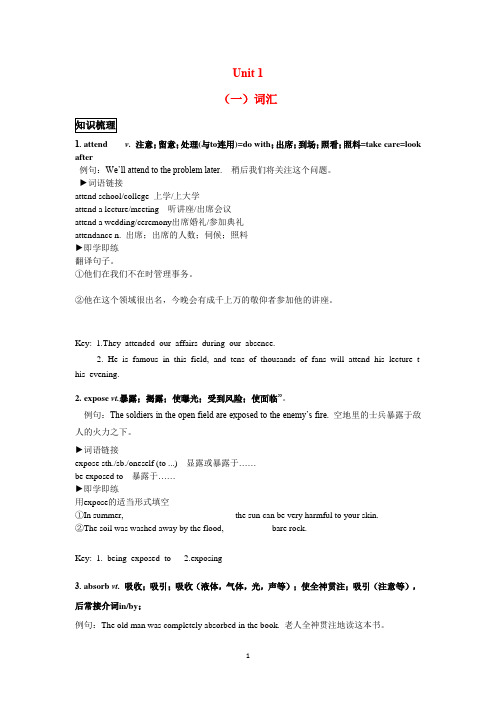
Unit 1(一)词汇1. attend v.注意;留意;处理(与to连用)=do with;出席;到场;照看;照料=take care=look after例句:We’ll attend to the problem later. 稍后我们将关注这个问题。
►词语链接attend school/college 上学/上大学attend a lecture/meeting 听讲座/出席会议attend a wedding/ceremony出席婚礼/参加典礼attendance n. 出席;出席的人数;伺候;照料►即学即练翻译句子。
①他们在我们不在时管理事务。
_________________________________________________②他在这个领域很出名,今晚会有成千上万的敬仰者参加他的讲座。
____________________________________________________Key: 1.They attended our affairs during our absence.2. He is famous in this field, and tens of thousands of fans will attend his lecture t his evening.2.expose vt.暴露;揭露;使曝光;受到风险;使面临”。
例句:The soldiers in the open field are exposed to the enemy’s fire. 空地里的士兵暴露于敌人的火力之下。
►词语链接expose sth./sb./oneself (to ...) 显露或暴露于……be exposed to 暴露于……►即学即练用expose的适当形式填空①In summer,________ ________ ________ the sun can be very harmful to your skin.②The soil was washed away by the flood, __________ bare rock.Key: 1. being exposed to 2.exposing3. absorb vt.吸收;吸引;吸收(液体,气体,光,声等);使全神贯注;吸引(注意等),后常接介词in/by;例句:The old man was completely absorbed in the book. 老人全神贯注地读这本书。
- 1、下载文档前请自行甄别文档内容的完整性,平台不提供额外的编辑、内容补充、找答案等附加服务。
- 2、"仅部分预览"的文档,不可在线预览部分如存在完整性等问题,可反馈申请退款(可完整预览的文档不适用该条件!)。
- 3、如文档侵犯您的权益,请联系客服反馈,我们会尽快为您处理(人工客服工作时间:9:00-18:30)。
必修5 Unit1 Great scientistsPart 1. Warming up1.explain及物动词(vt.)解释;说明;阐明[(+to)][+wh-][+(that)]He explained that he had been cheated. 他解释说他是上当受骗了。
Can you explain how the machine operates?你能解释一下这机器是如何运转的吗?Please explain this rule to me.请给我讲解一下这条规则。
不及物动词(vi.)解释;说明;辩解I've got to explain about it. 我得解释一下此事。
2.characteristicn. 特征;特性Kindness is one of his characteristics.adj. 独特的I heard my friend’s characteristic laugh.be characteristic of sb./sth. 是.....的特性Such bluntness is characteristic of hin. 如此迟钝是他的特性。
3. Who put forward a theory about black holes?put forward 提出(建议等);提名;提前,把时钟往前拨He put forward a new plan. 他提出一个新计划。
May I put your name forward as a possible chairman of the committee?我能否提名你当委员会主席?[归纳拓展]put down 记下;镇压put out 关掉;熄灭put aside 放在一边;储存;保留put off 推迟;延期put up 建造;举起;张贴put on 穿上put away 收好选词填空(put off, put up, put forward, put aside, put out)①The plan that you _____ at the meeting is wonderful.②Many tall buildings were _____ along the road.③Firefighters have been called to _____ the fire in the city center.④He has a little money to _____ for a rainy day.⑤Don’t _____ until tomorrow what can be done today.Part 2. Pre-reading, reading and comprehending1. Do you know how to prove a new idea in scientific researchhow to prove a new idea 为“疑问词+不定式”结构,该结构可在句中作主语、宾语、表语等。
We haven’t decided where to go. 我们还没有决定去哪里。
The question is when to leave. 问题是什么时候动身。
2.draw a conclusion 得出结论1)conclusion作名词,意为“结束,结论”come to/reach/arrive at a conclusion 得出结论in conclusion 最后I will in conclusion say a few words about my visit to Tokyo.最后,我对我的东京之行说几句。
2)conclude作动词,“结束;断定;决定”。
to conclude(作插入语)最后,作为总结(= to sum up)To conclude, I think smoking does more harm than good to us.3.John Snow was a famous doctor in London — so expert, indeed, that he attended Queen Victoria as her personal physician. 约翰·斯诺是伦敦一位著名的医生——他的确医术精湛,以至于成了照料维多利亚女王的私人医生。
expert①n. 专家,能手an expert in psychology(心理学)an agricultural expert② adj. 熟练的,有专门技术的an expert job需专门知识的工作He is expert in / at cooking.attend vt. &vi 参加,注意,照料① be present at参加attend a ceremony / lecture / a meeting② attend to (on): to look after, care for, serve伺候, 照顾,看护The queen had a good doctor attending (on )her.Dr Smith attended her in hospital.Mother had to attend to her sick son.③ attend to处理,注意倾听Can you attend to the matter immediately?I may be late – I have got one or two things to attend to.4. But he became inspired when he thought about helping ordinary people exposed to cholera. 但当他一想到要帮助那些得了霍乱的普通人时,他就感到很振奋。
(1) exposed to cholera 在句中是过去分词作后置定语,表示被动。
意为“患霍乱的”。
如:The book written by Luxun is very popular. 鲁迅写的书是很受欢迎的。
The man seen by us yesterday is Professor Smith. 昨天我们看见的那个人是史密斯教授。
(2) expose①暴露expose sb/sth to sth He exposes his skin to the sun. 他把皮肤暴露在阳光下。
②揭露He exposed their plot. 他揭穿了他们的阴谋。
The crime of the corrupt officials must be exposed without any reserve. 对贪官污吏的罪行一定要毫无保留地予以揭发。
exposed adj. 暴露的,暴露于风雨中的,无掩蔽的exposedness n. 暴露,显露expose sth. to the light of day 把某事暴露于光天化日之下expose a fraud 揭穿骗局练习:The disc, digitally _____ in the studio, sounded fantastic at the party that night.A. recordedB. recordingC. to be recordedD. having recorded5.Neither its cause nor its cure was understood. 对于它的起因和治疗方法人们都不清楚。
neither...nor...既不……也不,连接句中两个相同成分。
①I neither knew nor cared what had happened to him.我既不知道也不关心他出了什么事。
②Neither France nor Britain will attend the meeting next week.法国和英国都将不会参加下星期的会议。
③Neither Jim nor his parents have seen the film.=Neither his parents nor Jim has seen the film.吉姆和她的父母都没有看过这部电影。
cure vt. 治疗,治愈,改正n. 治疗,治愈,治疗法①cure sb(of sth)治好了某人(的...,...)The only way to cure backache is to rest. 治疗背痛的唯一办法是休息。
When I left the hospital I was completely cured.That nasty shock cured him of his inquisitiveness for ever. 那一沉重教训根除了他凡事爱打听的毛病。
This illness cannot be cured easily. 这种病不好治.②a cure for sth.治疗…的方法;解决问题,改善困境Is there a certain cure for cancer yet? 癌症迄今有无有效的治疗方法?The prices are going up every day, but there is no cure for rising prices.6.So many thousands of terrified people died every time there was an outbreak.人们既不知道它的病因,也不懂如何治疗。
每次爆发霍乱时就有成千上万惊恐的人病死。
(1)本句为复合句,“So many thousands of terrified people died” 为主句,every time引导时间状语从句,意思是“每当……”。
(2)有些名词短语或副词可以起连词的作用,引导时间状语从句。
例如:every time,eachtime,the last time,next time,the moment,the minute,immediately,instantly等。
①Every time/Each time I express an opinion,she argues back.每当我发表意见时,她总是反驳。
②I found myself in an entirely new world the moment/the minute/immediately I arrived here.我一到这里就感到耳目一新。
